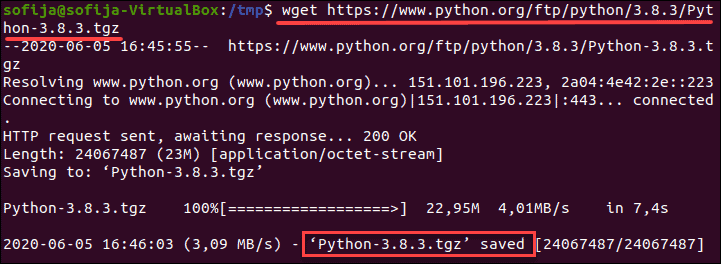

Libpython2.7-dev libquadmath0 libstdc++-5-dev libtsan0 libubsan0 linux-libc-dev make Libgomp1 libitm1 liblsan0 libmpx0 libpython-all-dev libpython-dev libpython-stdlib libpython2.7 Libcc1-0 libcilkrts5 libdpkg-perl libexpat1-dev libfakeroot libfile-fcntllock-perl libgcc-5-dev Libalgorithm-diff-xs-perl libalgorithm-merge-perl libasan2 libatomic1 libc-dev-bin libc6-dev
#Install python 2.7 ubuntu 16.04 install#
The installation via apt-get is sure to install the required dependencies e.g, here's the output for installing pip2: $ sudo apt-get install python-pipīinutils build-essential dpkg-dev fakeroot g++ g++-5 gcc gcc-5 libalgorithm-diff-perl You'll need both python-pip for the Python 2.7 pip and the python3-pip for the Python 3 pip. Python3-pip - alternative Python package installer - Python 3 version of the package Python-pip-whl - alternative Python package installer Python-pip - alternative Python package installer So to install pip, again, it's as easy as sudo apt-get install python-pip : $ sudo apt-cache search -n pip | egrep '^python*-pip'

Libpython2.7-minimal libpython2.7-stdlib python2.7 python2.7-minimalĠ upgraded, 4 newly installed, 0 to remove and 0 not upgraded.Īfter this operation, 15.8 MB of additional disk space will be used.Īfter installing python 2.7, $ type python3 python2.7 python3.5 python2 pythonīut there's still a problem, since you can't yet install PyPI modules via pip - e.g., if you want jupyter notebook, or the latest scipy or numpy (etc), you'll want to install pip and then pip install those, and still turning to apt-get to install any needed system dependencies, like graphviz or core system libraries. The following NEW packages will be installed: Libpython2.7-minimal libpython2.7-stdlib python2.7-minimal The following additional packages will be installed: The initial output of installing python 2.7 is as follows: $ sudo apt-get install python2.7 Installing python 2.7 is as easy as: $ sudo apt-get install python2.7 Note: before continuing, you will probably want to do a quick sudo apt-get update, sudo apt-get upgrade, and sudo apt-get dist-upgrade (please do note exactly what these commands are in fact doing I'm assuming a fresh install here.) The program 'python' can be found in the following packages: On a fresh install (note that there's not even a python executable): $ type python3 python2 python Tensorflow has been successfully installed.Continuing to document this for the latest Ubuntu releases 1 : for Ubuntu 16.04.1 server, the default Python is version 3.5, and Python 2.7 is not installed by default. When you are done using Tensor Flow, you may deactivate the environment by invoking the deactivate function as follows: (DIRECTORY_NAME)$ pip install –upgrade tensor flow Step4 : Issue one of the following commands to install Tensor Flow in the active virtualenv environment: The preceding source command should change your prompt to the following: Step3:Activate the virtualenv environment by issuing one of the following commands: Virtualenv –system-site-packages TARGET_DIRECTORY Step2 : Create a virtual environment by issuing one of the following commands: Sudo apt-get install python-pip python-dev python-virtualenv Step1 : Install pip and virtualenv by issuing one of the following commands: With the deep learning and research of google tensor flow, which is an open source library deployes across the Google ecosystem.
#Install python 2.7 ubuntu 16.04 software#
One of the software library named as tensor flow can be developed by Google and do computations with data flow graphs.It is an open-source that covers the guide who told you why the library matters and how you can use it.


 0 kommentar(er)
0 kommentar(er)
